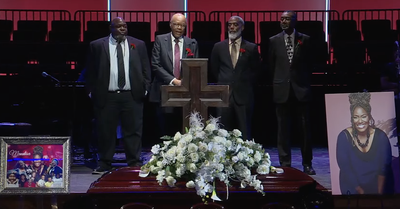(CNSNews.com) - South Koreans Thursday were evaluating the deal Seoul made with the Taliban for the release of Christian aid workers held hostage in Afghanistan for more than 40 days.
Amid news that 12 of 19 remaining hostages had been released Wednesday -- with the rest expected to be freed in the coming days -- commentators and editorial writers expressed the widely held relief that the country's most serious hostage crisis appeared to be approaching resolution.
But many also wondered about the cost, and not just because of suspicions that a ransom may have been quietly paid.
The South Korean government announced Wednesday that it has agreed to withdraw forces from Afghanistan by the end of the year -- confirming a decision made earlier -- and also said that it will not allow Korean "Christian missionaries" go to Afghanistan in the future.
Members of the Taliban militia fighting the Afghan government and the NATO-led International Security Assistance Force (ISAF) abducted 23 Koreans as they traveled on a bus on July 19, killed two of them in the ensuing days, and later released two women among the group.
During the crisis, Korean officials held four rounds of direct negotiations with Taliban representatives, who initially demanded the release of Taliban prisoners in exchange for the hostages. That demand was dropped this week.
Together with speculation about a ransom payment, the Korea Herald wondered whether the Afghan government would release some Taliban prisoners in the days ahead, particularly at the beginning of Ramadan, the Islamic fast-month that begins in about a fortnight's time.
Korea has had a small military contingent -- 210 medical and engineering troops -- in Afghanistan since 2002, but President Roh Moo-hyun's government, bowing to domestic pressure, agreed last year to end the mission by the end of 2007.
As such, the agreement with the Taliban did not appear to affect that timetable. But the government's willingness to deal with terrorists -- and to give them legitimacy as negotiating partners -- nonetheless drew considerable comment.
(In mid-2004, Seoul defied demands from terrorists holding a Korean translator in Iraq, pledging to honor its troop commitments in that country. The terrorists beheaded the hostage. Later that year, the Philippines withdraw a small military contingent from Iraq to appease terrorists who were threatening to kill a Filipino hostage.)
"For the first time ever, we had to negotiate directly with terrorist abductors," the conservative Chosun Ilbo said in an editorial. "We cannot deny the fact that this precedent could possibly act as a burden on Korea's international image in the future."
Korea Times agreed the episode could damage the country's international image, saying that the government's face-to-face talks with the Taliban helped the terrorists to "emerge with enhanced political legitimacy as a result of a successful negotiation with a foreign government."
The Korea Herald sympathized with the government's decision: "In this case, the lives of its nationals were more important than international conventions."
Another daily, Joong-Ang Ilbo, said although the government broke the principle of not negotiating with terrorists, it had no choice, given the danger facing its citizens.
At the same time, it said the episode increases the possibility of more such cases in the future.
Apart from the Koreans, the Taliban has this year taken hostage two German technicians, two French aid workers and an Italian photojournalist. The three European countries are among 37 nations contributing to the ISAF mission which the Taliban is trying to thwart. The militia ruled most of Afghanistan until U.S.-led forces ousted it from Kabul in late 2001 after its al-Qaeda allies carried out the 9/11 terror attacks.
State Department spokesman Tom Casey welcomed news of the releases Wednesday but declined to comment in any detail, saying he would defer until all the hostages were free and safe.
He did reaffirm the U.S. policy about no making concessions to terrorists, and also stressed that the hostages should never have been abducted in the first place.
"It's ... representative of the kind of enemy we're facing in Afghanistan, that the Taliban engages in kidnapping, and also, we shouldn't forget, in the murder of several of these hostages as well," he said.
'More vulnerable'
Meanwhile, Korean Christian organizations are mulling the part of the government's deal with the Taliban that affects missionary work in Afghanistan.
The National Council of Churches in Korea, a Protestant organization, said in a statement it would examine "Korean churches' overseas volunteer and missionary work, and make this an opportunity to bring about more effective and safer volunteer and missionary work."
Even before the deal was announced, Christian organizations said they were reviewing how to work in sensitive areas of the world.
About one-quarter of the Korean population is Christian. Three decades ago, fewer than 100 Korean missionaries worked abroad, according to the Korea Research Institute for Missions. That number had grown to at least 15,000, operating in more than 165 countries, the institute's director, Dr. Steve Moon, said Thursday.
Moon told Cybercast News Service that Korean missionaries are "brave and zealous, but often lack cultural sensitivity in the field."
He thought the hostage crisis would have both negative and positive ramifications. "Many Korean missionaries who work in such sensitive areas as Islamic countries may be endangered for they are more vulnerable than before," he predicted.
On the other hand, "Korean missionaries and short-term workers will prepare themselves better for their activities abroad, which will be a good indicator of maturity and development."
Moon said the generally sympathetic attitude of Koreans towards Christian missionaries had shifted significantly as a result of the hostage-taking.
"The public opinion has changed phenomenally after the crisis. There were criticisms and vicious comments on the way Korean churches do missions. This aspect is the biggest loss on the part of Korean churches, which seems to be very hard to recover."
The Afghan Islamists have long been hostile to Christians. A month before 9/11, the then-ruling Taliban arrested eight foreign Christian relief workers, including two Americans, along with 16 Afghan Christians accusing them of trying to convert Muslims to Christianity. They were eventually freed, days after the Taliban fled Kabul.
Since the Taliban's fall, its adherents have on occasion also killed Afghan Christians, including five in one four-month period in 2004.
Last year the government of President Hamid Karzai came under fire when an Afghan convert from Islam was threatened with execution. After the case drew strong international reaction, Abdul Rahman was set free and allowed to leave the country.
Make media inquiries or request an interview about this article.
Koreans Mull Costs of Deal With Taliban
Patrick Goodenough
| International Editor
| Updated: Sep 04, 2007










